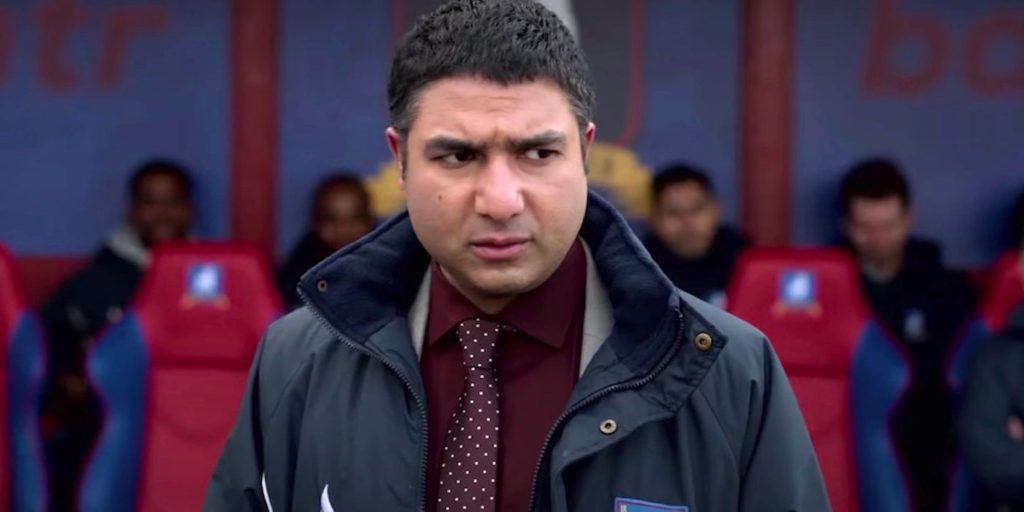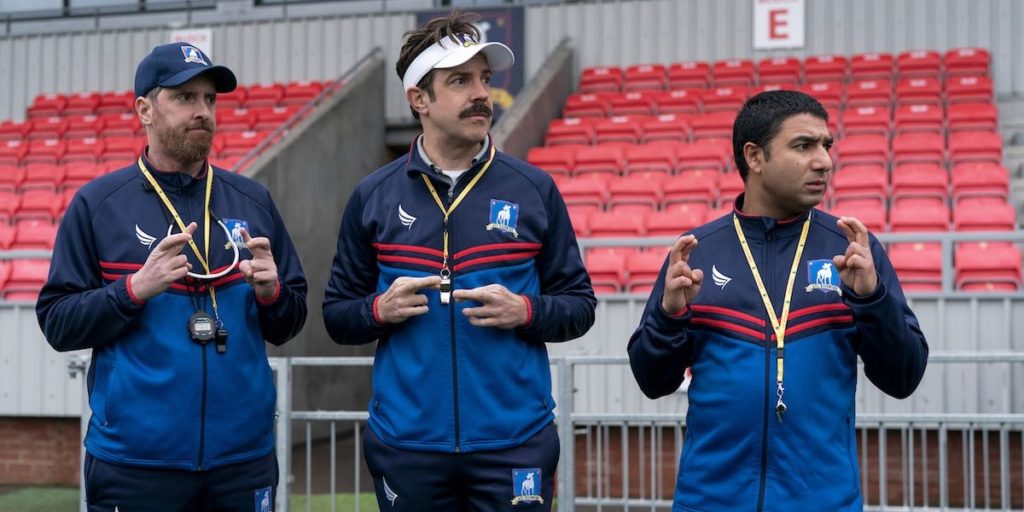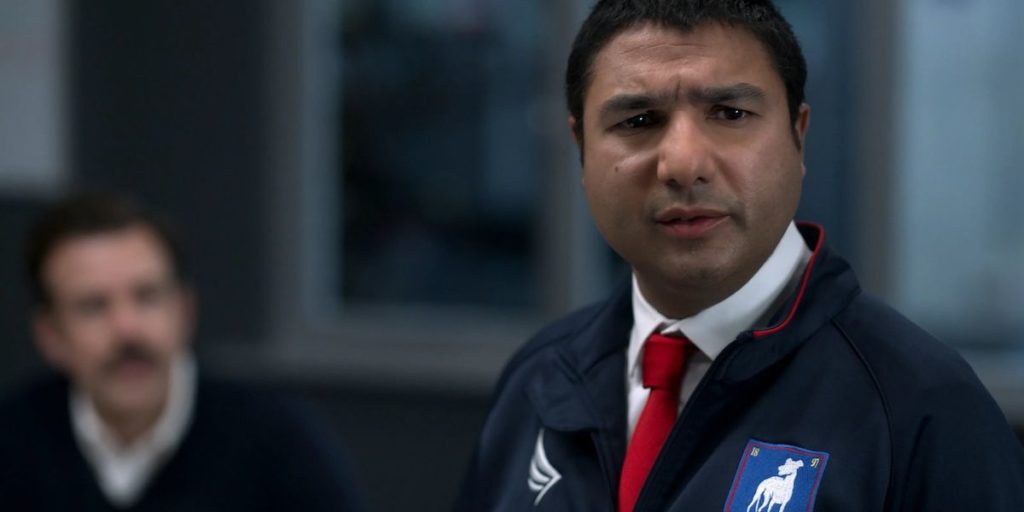In the first season of Ted Lasso, Nathan Shelley (Nick Mohammed) is first portrayed as a decent man that Jamie Tartt (Phil Dunster) and his friends on the Richmond squad enjoy harassing. The team’s kit guy, Nate, is frequently used as a punching bag by the younger players. But when Ted (Jason Sudeikis) takes over as the team’s coach, he drastically changes things for Richmond, which includes assisting Nathan in overcoming the abuse and learning to stand up for himself. Nate contributes positively to the team during Season 1, and by the season’s conclusion, he has been promoted to the position of assistant coach in addition to being accepted fully into the team as a buddy. Nate appears to be on the right track, but Season 2 shows that his trajectory is very different from what we could have anticipated.
Nate’s extreme insecurity makes him an easy target in Season 1. He feels as though he has never lived up to his father’s expectations, plays a supporting role on a football team that struggles, and is frequently made the laughing stock of the locker room. Nate internalises the sensation of inferiority since he is accustomed to experiencing it. So, in Season 2, we see his burgeoning ego at odds with his insecurities. He becomes more and more ambitious as a result of his newfound success. He was made to feel special, and now he wants more, as he explains to Ted towards the end of the season. And as the season goes on, we see as his activities start to degenerate into poisonous behaviour that starts to harm both himself and people around him.
One could anticipate that the toxic elements in a show about football would primarily come from characters like Jamie Tartt, who exhibit more stereotyped behaviour. One might think of “toxic masculinity” when they hear the terms “overly macho bluster, objectification of women, and a lack of connection to one’s emotions.” Nate, though, is not like that. Nate is sensitive, frequently doubts his abilities, and seems to have no luck finding a date. His toxic nature stems from believing that they are flaws. Nate is the jaded incel who wants to hold the world responsible for everything that is wrong in his life, not the poisonous alpha guy.
Since the beginning of the season, there has been a feeling that something is wrong with Nate. And when Roy joined the staff as a new coach, the tensions were evident by the way he seemed when he saw Roy on the field. Nate persisted in doing what he could, though. However, it peaked when Ted had to leave a game due to a panic attack and Nate issued the decisive orders that gave Richmond the victory. A little buzz was created around his name following an interview in which he unintentionally referred to himself as “The Wonder Kid,” and Nate developed an obsession with monitoring online mentions of him. His ego was only inflated by the fact that the same validation he had received from Ted in Season 1 was now being shouted at him a thousand times over on Twitter by random individuals. He began to think that this success wasn’t only what he had worked for, but something he naturally earned.
Nate’s destructive behaviour typically takes the form of a sense of entitlement. He put in a lot of effort in Season 1 to win his position as an assistant coach, but he appears to believe that because of this new position, he deserves special treatment. He says, “I think Ted gets all the credit for the moves we come up with,” to Roy (Brett Goldstein) and Coach Beard (Brendan Hunt). Nate turns the debate around and claims that Ted is only doing that so that if the move goes bad, everyone will blame him. This is after Ted subsequently specifically named Nate’s move after him. To rationalise his fury at Ted for merely carrying on as usual, Nate keeps attempting to recast their relationship as one of hostility.
The fact that Ted has been concentrating so much on others this season has particularly offended Nate. Nate perceives this lack of attention as a slight against him, whether it be against him or other team members or his own mental health. Because of his insecurities, he believes Ted was merely exploiting him, even if anyone watching could see how incorrect that belief is. He acts coldly, rudely, and dishonestly toward Ted because he believes he is no longer unique. Nate breaches Ted’s confidence by telling the media about Ted’s panic attacks when that fails to allay his feelings of uncertainty.
Nate has begun externalising his insecurities in an effort to overcome them. Previously, he would internalise them, which would further erode his sense of worth, but with Ted’s assistance, he was able to regain some self-assurance. He is currently venting that confidence on other people. Nate makes it his mission to treat the new kit man as terribly as he was treated when he held the same position after they hire him. His negativity is externalised, which provides him a sense of control. He doesn’t want to develop the amusing and humorous relationships he started in the first season because he wants to keep establishing his new position in the hierarchy. He used to roast team members with a sense of camaraderie, but now it seems lot more hostile. There is no longer any playfulness. He interprets the team’s decision to manufacture him a “Wonder Kid” Richmond jersey as a snub rather than a gesture of inclusion. Nate has become increasingly emotionally distant because he interprets any display of fun or silliness as an attempt to restore him to his “rightful” position in the hierarchy, which is done only to denigrate him.
In the middle of the season, Nate is struggling to reserve a suitable table for his parents’ anniversary at a restaurant. He asks Rebecca (Hannah Waddingham) and Keeley (Juno Temple) about it in the hopes that she will reserve a table for him, but she instead gives him tips on how to get in the right frame of mind to be forceful. Nate then offers his own interpretation of Rebecca’s technique for feeling powerful, which involves making oneself feel tall and huge. But just in this act, we can see how he’s using the trick in a more perverted way. Nate uses the mirror to mentally prepare himself by spitting at his image. Nate wouldn’t commit such a visceral, repulsive, and stereotypically macho behaviour.
Even worse, Nate makes a play on Keeley when she takes him shopping for a new suit (his current one was a gift from Ted, much to his dismay). Nate has always been a courteous man who has difficulty with women, but as his toxic masculinity comes to the surface, he begins to interpret their rejections as less benign. When Keeley pushes him away, he withdraws to the dressing room and performs his mirror psych-up ritual, conveying rage rather than guilt. Now that he believes he is a stronger man, he feels entitled to a response. When Roy doesn’t want to attack him over the incident, he gets furious because he interprets that as Roy not believing in him as a person but rather as Roy making fun of his own masculinity.
You really want to keep defending Nate as a viewer. We know how compassionate he can be, how cunning his strategies are, and how much he has endured in the past, but there comes a point where we must stop ignoring or justifying his behaviour. His bad behaviour is not justified by his insecurity. In an effort to regain some sense of authority, he rejects the team’s gift of a bespoke jersey, kisses Keeley against her will, discloses Ted’s private medical issues to the media, and joins a rival club run by Rebecca’s ex-husband. And by the time the story is over, after all these things have happened, we understand Nate is no longer the guy we knew; he has turned evil of his own free will.
Nate is a great illustration of the various ways toxic masculinity can appear. His sense of ego and bravado is one that is inextricably linked to this feeling of misplaced masculinity, which he is overcompensating for in his violence by spitting at his own reflection. His fears manifest in insults that he directs at others. Nate Shelley begins the season as our likeable friend but becomes into a traitor and an adversary by the conclusion. He simultaneously has both superiority and inferiority complexes, which lead to a self-destructive spiral that negates everything we thought we understood about him. Nate became a completely different person after gaining some authority and respect because he began to view those things as something he was naturally entitled to rather than something he had to work for. Mohammed was nominated for an Emmy for this part, and the work he put into giving Nate this season’s villain arc was more than enough to get him that nod. In Season 2 of Ted Lasso, Nate was radically different, demonstrating how much a person can transform when they allow their toxic and bad emotions to fester.



